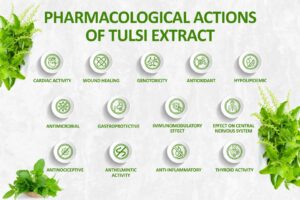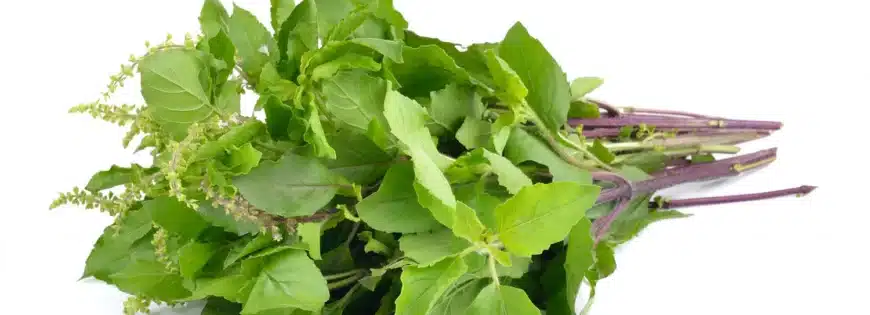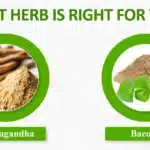In our fast-paced modern world, where stress and lifestyle-related chronic diseases are on the rise, there is a growing interest in ancient remedies like Ayurveda. Among the various herbs used in Ayurveda, Tulsi (Ocimum sanctum Linn.) stands out for its diverse benefits, a fact increasingly supported by scientific research. Tulsi, known as holy basil, is special in Indian culture and traditional medicine. With a history spanning over 3000 years within the Ayurvedic system, Tulsi is revered as the “Medicine of Life” for its therapeutic properties. This aromatic herb, native to the Indian subcontinent, has garnered attention for its adaptogenic, antimicrobial, anti-inflammatory, cardioprotective, and immunomodulatory effects. 1 2
Botanical Name– Ocimum sanctum L.
Plant Parts Used– Leaves
Active Constituents– Eugenol, Ursolic Acid, Rosmarinic acid, Apigenin, Myretenal, Luteolin, β-sitosterol, and Carnosic acid
Specifications–
- Tulsi Extract (2% – 10% Ursolic Acid, HPLC)
- Tulsi Extract (2.5% – 10% Tannins, Gravimetry/Titration)
- Tulsi Essential oil (up to 80% Methyl Chavicol)
- Tulsi CO2 Oleoresin
Tulsi as Traditional Indian Ayurvedic Medicine:
Tulsi Ocimum sanctum plant is revered in Indian Ayurvedic medicine for its remarkable healing properties. Rich in essential oils and antioxidants, Tulsi proves highly effective in combating stress. Beyond its traditional use by Hindus, Tulsi’s therapeutic potential is increasingly recognized by diverse communities. Functioning as an adaptogen, it harmonizes bodily processes, significantly aiding stress management. Tulsi extracts, deeply rooted in Ayurvedic and Unani systems, are used for many health issues, including colds, headaches, inflammation, and heart disease. 2
Modern Medicine and Research Findings:
In modern medicine, research indicates Tulsi’s potential effectiveness in treating conditions such as ulcers, high cholesterol, Type 2 diabetes, obesity, and compromised immune systems. Tulsi essential oil containing anti-inflammatory compounds like eugenol offers diverse health benefits. Beyond its medicinal benefits, the plant enhances flavors and is a delightful addition to cooking or tea. It is particularly highlighted for potential benefits in managing diabetes through enhanced insulin secretion. 2
Pharmacological Actions of Tulsi Extract

Tulsi’s versatile actions include antimicrobial, antioxidant, anti-inflammatory, and adaptogenic properties. Some animal Research supports its efficacy in protecting organs against chemical stress, counteracting metabolic stress by normalizing blood glucose and lipid levels, and mitigating psychological stress through anxiolytic and antidepressant effects. Let us understand the integral role of holy basil Ocimum sanctum in addressing various health concerns. 1
1. Cardiac Activity: Research on rats indicates that Holy Basil extracts have positive effects on heart health. In stressed rats, the extract prevents stress-induced changes in the heart. Additionally, feeding rats with O. sanctum L. inhibits isoproterenol-induced alterations in enzyme activities. Different doses of O. sanctum L. extract also show significant reduction in markers of heart damage in rats with induced myocardial infarction. The study suggests potential cardioprotective effects. 3 4
2. Wound Healing: Tulsi may help wounds heal faster by making them stronger and forming new tissue. For unusual healing situations like keloids and hypertrophic scars, Tulsi supports effective wound contraction shown in an animal study. Even when healing is slowed by dexamethasone, Tulsi shows promise in overcoming medication challenges. It’s a natural friend in helping the body heal better. 3
3. Genotoxicity: Tulsi, with its leaf extract, can help fight against harmful effects caused by heavy metals like chromium and mercury. In animal trails, Ocimum sanctum leaf extract supports recovery, helps restore the cell division process, and reduces changes in our chromosomes. Tulsi’s ability to protect against genetic damage from environmental factors makes it a natural helper, especially in smaller amounts. 3
4. Antioxidant: Tulsi may possess remarkable stress-fighting abilities due to its antioxidants found in essential oils and water extracts. These antioxidants play a crucial role in safeguarding our cells by enhancing the activity of key antioxidant enzymes. Tulsi also demonstrates efficacy in preventing damage caused by elevated cholesterol levels. In summary, Tulsi serves as a potent antioxidant, fortifying cellular health and contributing to overall well-being. 3 4
5. Hypolipidemic: Tulsi helps keep our cholesterol in check by lowering levels of serum cholesterol, triglycerides, and LDL + VLDL cholesterol. When given as seed oil to cholesterol-fed rabbits, it makes a significant difference in reducing lipid levels. These positive changes in our lipids show that Tulsi can be a natural helper in promoting heart health through its cholesterol-lowering effects.
Also Read – Fruit Powders
In clinical research, human subjects with elevated triglyceride and cholesterol levels at baseline experienced significant reductions in cholesterol levels. Triglyceride readings showed a downward trend. There were no significant changes in the remaining parameters evaluated. This showed Tulsi extract had cardioprotective effects in the study population, dramatically lowering cholesterol levels. 3 4
6. Antimicrobial: Tulsi’s oil and extracts are strong against bacteria like Staphylococcus aureus, and Pseudomonas aeruginosa. Tests on agar plates show that Tulsi has the power to fight many different microorganisms. This means Tulsi could be a natural way to help the body handle infections and maintain a healthy balance of microbes. 3
7. Gastroprotective: It may help our stomach in many ways. It may protect against stress-induced ulcers and stop the production of harmful acid pepsin. Tulsi also reduces damage and increases the protective mucus in the stomach. It may even prevent ulcers caused by aspirin and alcohol, showing that Tulsi is a natural protector for our stomach, promoting good gastrointestinal health. 3 5
8. Immunomodulatory Effect: In research conducted in mice, Tulsi’s adaptogenic and immunomodulatory properties were highlighted, providing a rationale for its traditional use in promoting general health protection. The study revealed that Tulsi extract did not show any toxic effects, reinforcing its reputation as a non-toxic plant with a high lethal dose (LD50) in the experimental mice. The subjects in the study, who were young and healthy, experienced no adverse effects on basic biochemical parameters, body mass index (BMI), blood pressure, or renal function. 4
9. Effect on Central Nervous System (CNS): Tulsi has various effects on our brain. It may help improve memory and affect the levels of chemicals that send messages to our brain. It may influence dopamine and serotonin levels, suggesting that Tulsi might be helpful for our thinking and mood. Its ability to adapt makes it a potential friend for keeping our nervous system healthy. 3
10. Antinociceptive (Analgesic): Tulsi may help with pain relief! Its leaf extract, especially the alcoholic one, has shown it can reduce discomfort and make pain go away in different animal tests. This means Tulsi could be a natural way to manage various conditions that cause pain. 3
11. Anthelmintic Activity: Tulsi’s essential oil, particularly eugenol, exhibits anthelmintic activity against parasites. An In-Vitro Comparative Study on parasite worms suggests its potential in combating helminthic infections, highlighting its role as a natural anthelmintic agent. 3 6
12. Anti-Inflammatory: Compounds isolated from Tulsi demonstrate significant anti-inflammatory activity, reducing inflammation in acute and chronic conditions. The inhibition of cyclooxygenase and lipoxygenase pathways emphasizes Tulsi’s potential in managing inflammatory responses and promoting overall anti-inflammatory effects. 3
13. Thyroid Activity: Tulsi’s impact on thyroid function is noteworthy, with its leaf extract demonstrating regulatory effects on thyroid hormones in male mouse. This suggests its potential role in influencing thyroid activity, making it an area of interest in thyroid health. 3 7
Modern scientific research into Tulsi validates its multifaceted benefits, aligning with the wisdom embedded in Ayurveda and Hinduism. As a plant that can be worshiped, ingested, and used for medicinal and spiritual purposes, Tulsi provides a bridge between ancient knowledge and modern solutions. Beyond individual homes, its cultivation becomes a force for positive social, economic, and environmental change, exemplifying the potential of traditional practices to address contemporary challenges. 1
Note: While the information provided is based on credible references, we do not make any specific claims or guarantees. It is important to consult with your healthcare advisor for personalized advice and guidance related to your health.






